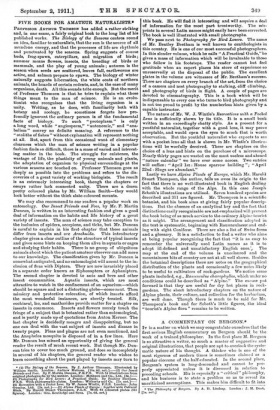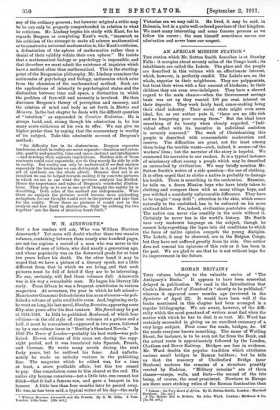A COMMENTARY ON BERGSON.* IT is a matter on which
we may congratulate ourselves that the first serious English commentary on Bergson should be the work of a trained philosopher. In the first place M. Bergson is so attractive a writer, so much a master of suggestive and original illustrations, that people are apt to overlook the syste- matic nature of his thought. A thinker who is one of the most rigorous of modern times is sometimes claimed as a popular cicerone of the half-educated. In the second place, Bergson's system is long-descended and cannot be pro- perly appreciated unless it is discussed in relation to preceding schools. His is especially a " critical" philosophy, and his business is to state a problem so as to reveal its uncriticized assumptions. This makes him difficult to fit into
• The Philosophy of Bergson. By A. D. Lindsay. London : J. M. Dent. [5s. net.]
any of the ordinary grooves ; but however original a critic may be he can only be properly comprehended in relation to what he criticizes. Mr. Lindsay begins his study with Kant, for he regards Bergson as completing Kant's work, "inasmuch as his criticism of the attempt to make all science mathematical or to construct a universal mathematics is, like Kant's criticism, a delimitation of the sphere of mathematics rather than a denial of their validity within their own sphere." He insists that a mathematical biology or psychology is impossible, and that therefore we must admit the existence of inquiries which have a method other than mathematical. This is the starting- point of the Bergsonian philosophy. Mr. Lindsay examines the antinomies of psychology and biology, antinomies which arise from the obsession of the mathematical method. Such are the applications of intensity to psychological states and the distinction between time and space, a distinction in which the problem of free-will and necessity is involved. He then discusses Bergson's theory of perception and memory, and the relation of mind and body as set forth in Matter and Memory. In the last chapter he deals with the difficult question of " intuition " as expounded in Creative Evolution. He is always lucid, and, strong though his admiration is, he has many acute criticisms of his own to offer. We can give no higher praise than by saying that the commentary is worthy of 'its subject. Take this admirable account of Bergson's method:
" Its difficulty lies in its abstractness. Bergson separates tendencies, which in reality are never separate—duration and exten- sity, quality and quantity, time and space, instinct and intelligence —and develops their separate implications. Neither side of these contrasts could exist separately, nor do they merely lie side by side in reality. But reality can only be understood if we first analyse separately the tendencies we can distinguish in it, and then by an act of synthesis see the whole afresh. Because that act is an intuition we can be helped towards making it by concrete pictures in which we see as one what the previous analysis has divided. Hence the importance and value of Bergson's wonderful illustra- tions. They help us to see in one act of thought the reality he is describing. Both sides of the method are indispensable. Were there no analysis the pictures would become mere misleading metaphors, for our thought would rest in the picture and take that for the reality. Were there no pictures it would rest in the analysis and lose itself in abstraction. Only `by rubbing the two together' can the flame of intuition burst forth."







































 Previous page
Previous page